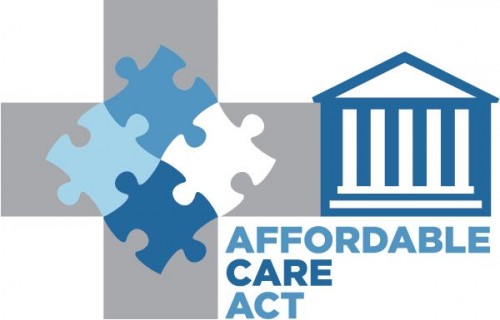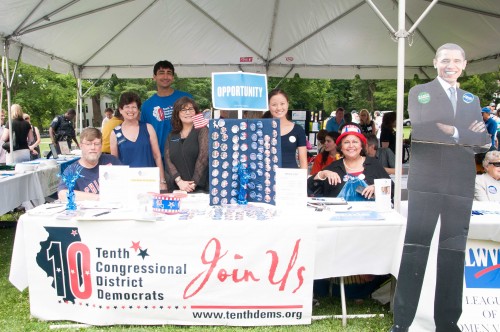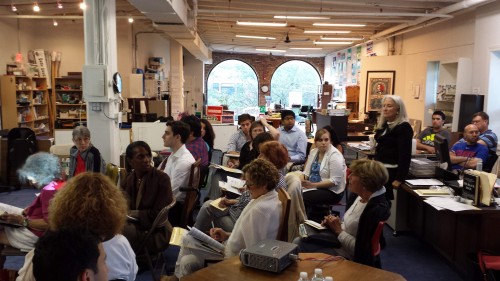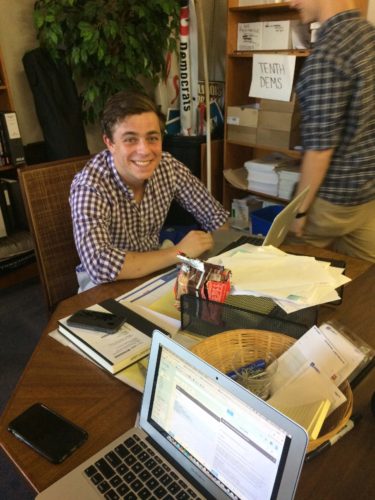
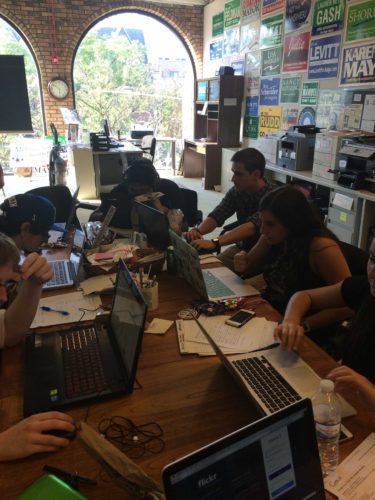
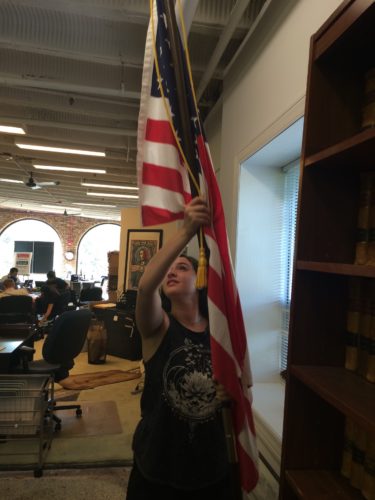
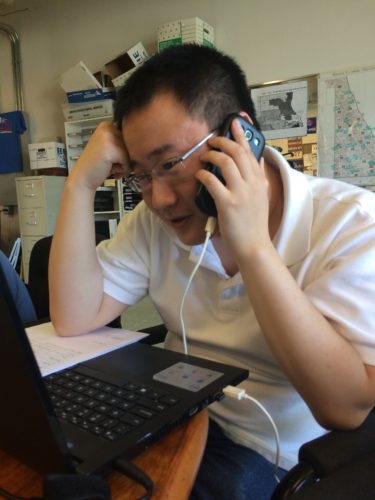
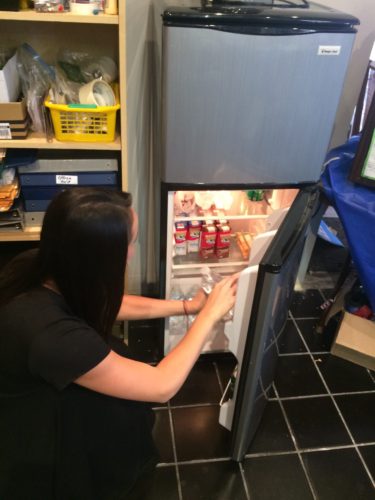
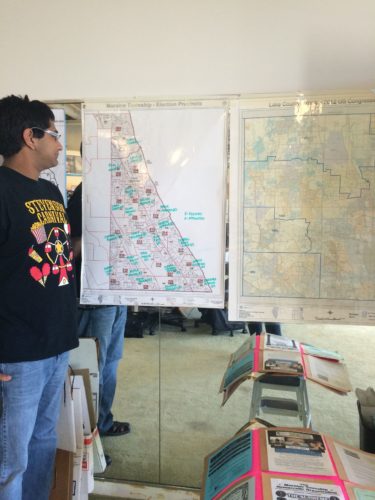
By Danielle Resnick
As schools let out for the summer and temperatures begin to rise, so does the energy in Tenth Dems offices. High school and college students and recent college graduates from around the 10th Congressional District gather for a fun, educational, hands-on experience as Tenth Dems summer interns. The Tenth Dems summer program is a time commitment of at least sixteen hours a week; however, interns often choose to devote much more of their time to these volunteer activities.
Tenth Dems prides itself on providing a very wide range of opportunities in a variety of fields, from planning and staffing events and doing research, to assisting state legislators in their offices, making the experience unique to each individual. Gaining knowledge and connections along the way, the Tenth Dems interns are able to familiarize themselves with, and get personally involved in, the political process at a grassroots level. Interns frequently further their political careers after their summers with the Tenth Dems by obtaining jobs with elected officials and candidates in Springfield, as well as in Washington, DC.
Here is an introduction to this year’s summer interns:
Aneesa Ahmed: Aneesa is no stranger to working in politics. Last summer she worked as an intern/field associate for Julie Morrison in her campaign for State Senate. That’s how Aneesa became aware of Tenth Dems and the organization’s work. Aneesa is a recent graduate of Lake Forest College, where she earned her bachelor’s degree in politics as well as economics. She loves to read, but also enjoys spending time outside, particularly playing tennis and swimming. Her dream job would be to one day work in politics as a policy maker.
Amelia Berger: Amelia graduated from Deerfield High School in 2013 and went on to study political science and communications at the University of Illinois at Urbana-Champaign. She is the president of UIUC’s Gamma Phi Beta sorority, a wonderful learning experience for her. She hopes one day to attend law school or go into politics. Amelia’s family has always been very involved in politics and inspired her to reach out to the Tenth Dems in order to get a deeper look into the political world.
Sam Braganca: Like Amelia, Sam will be studying political science at the University of Illinois at Urbana-Champaign. This is his second summer with Tenth Dems, as he continues his intern experience from last summer. Sam enjoys athletics as well, playing basketball with friends and sailing in his free time. He hopes to one day be Vice President of the United States and is increasing his knowledge of the political process through his time with the Tenth Dems.
Noah Daniel: After this summer, Noah will be attending Grinnell College, a liberal arts school in Grinnell, Iowa, and like many other Tenth Dems interns, is planning on studying political science. He loves playing baseball in his free time as well as taking the occasional break to curl up on the couch and watch his favorite TV shows and movies on Netflix. He hopes to one day become a politician.
Conor Kennedy: Conor is a junior at Libertyville High School who plans to study economics and political science in college. Conor has considered a career in law as a private attorney, but he is keeping his mind and options open. His family is very involved with the Tenth Dems and Conor himself wanted to familiarize himself with campaign organization, communications, and political research through his summer internship.
Justin Lenz: Justin is from Libertyville and will begin his junior year at Lawrence University this fall. Justin is a great help around the office, as he is double majoring in government and German. As a government student, he hopes to gain a deeper understanding of politics at a local level through his summer with the Tenth Dems. He ultimately plans to become a lawyer. When not at the office, Justin enjoys playing video games and watching Netflix, as well as cooking up meals for his family and friends.
Michael Pierce: Michael is a senior studying international relations and history at Clark University, though he would someday like to go to law school or enter the non-profit sector. Through this internship he hopes to gain transferable skills that can be used in a future career in politics or in any other field. He hopes to acquire the tools necessary to make a difference in any situation and under any circumstances.
Arun Pookote: Also attending Lake Forest College, Arun is studying political science and communications. Last summer he spent time as an intern for Brad Schneider’s reelection campaign. He enjoyed canvassing in Highland Park, where he met leaders of Tenth Dems and learned about the organization. He hopes to gain experience on legal cases and a better understanding of politics. Arun loves to read, sing, dance, and do zumba in his free time.
Danielle Resnick: Danielle is a rising junior at Indiana University-Bloomington, studying journalism. She is the alumni relations chair for IU’s chapter of Alpha Epsilon Phi sorority and is very happy to be working with the Tenth Dems this summer. She is taking this internship as a chance to explore the political world and network in the field. Danielle has been a dancer for most of her life and enjoys spending time with family and friends, as well as her dog, Sonny.
Jonathan Rudnick: A junior at Drake University, Jonathan is studying politics and computer science. He has been an incredible asset to the Tenth Dems team with his wonderful work transforming and updating the organization’s website. Jonathan also designed the July issue of Tenth News, and will continue to function as one of this newsletter’s regular designers even after he returns to school.
Ariel Sheffey: Ariel first got involved in politics through her internship with Tenth Dems in the summer of 2013. She continued her internship through 2014 and is now one of this summer’s internship coordinators. Ariel has also interned for State Representative Scott Drury and volunteered for Democratic congressional campaigns. Outside of politics, Ariel is involved in cross country and dance. She hopes to pursue a career related to political economics or computer science.
Peter Shin: Peter recently graduated from the University of Chicago where he studied math. His unique skills make him an invaluable asset to the intern team. Originally, Peter contacted Tenth Dems simply to volunteer. When he was made aware of the internship program, he seized this excellent developmental opportunity. Peter is still exploring his options as far as a future career is concerned.
Ally Silverman: Ally is a rising junior at Adlai E. Stevenson High School, but has big plans for her future, seeing her Tenth Dems internship as the first step in her goal of one day becoming President of the United States. She plans on studying international studies, political science, or international relations once she moves on to a university. Ally is very involved in extracurricular activities at Stevenson: she is ranked statewide for her oral argument from Youth and Government, is an inductee mentor for her school’s National Honor Society, is vice president of Peer Tutors, and received outstanding junior awards in Chinese, Latin, and Youth and Government.
Joel Spiegel: Joel is a student at the University of Massachusetts Amherst, majoring in political science and minoring in sustainable community development. Joel first got involved with politics through social justice work with the Jewish Council on Urban Affairs and, later, an internship with the Interfaith Committee for Detained Immigrants. Joel interned with Tenth Dems in the summer of 2014 and now serves as an intern coordinator along with Ariel Sheffey. On campus, Joel is involved with TEDxAmherst and is active with the Public Higher Education Network of Massachusetts, advocating for accessibility and affordability of public higher education.
Haley Wint: Haley is a rising senior at New Trier High School. When Haley isn’t reading or competitively figure skating, she is in a Tenth Dems office hoping to learn more about politics and become more involved with the political process in her community. One day, after studying political science and history in college, she hopes to become a campaign manager or elected official.

